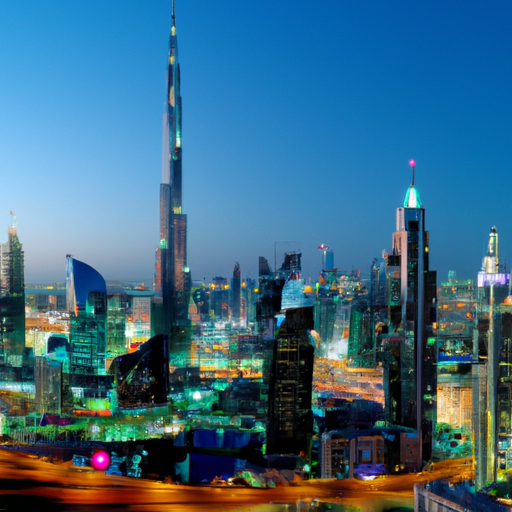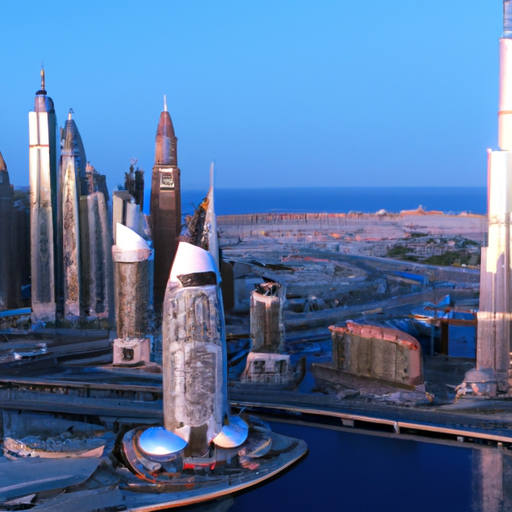
Dubai’s Rapid Growth in the Hospitality Industry: A Look at the Expanding Hotel Room Capacity
Dubai, the vibrant and cosmopolitan city in the United Arab Emirates, is known for its luxurious hotels and world-class hospitality. With its stunning architecture, pristine beaches, and bustling business district, it’s no wonder that Dubai has become a top tourist destination. As the city continues to attract millions of visitors each year, the demand for hotel rooms has skyrocketed. In response to this growing demand, Dubai is set to have an impressive 154,000 hotel rooms by 2023.
Dubai’s rapid growth in the hospitality industry is a testament to its commitment to providing exceptional experiences for its visitors. The city has seen a surge in hotel construction projects, with numerous properties being developed to cater to the increasing number of tourists. This expansion is not only limited to luxury hotels but also includes a wide range of accommodations to suit every budget and preference.
One of the key factors driving this growth is Dubai’s strategic location as a global hub for business and leisure. The city’s proximity to major international markets, coupled with its excellent infrastructure and connectivity, has made it an attractive destination for both business travelers and holidaymakers. As a result, hotel developers and investors have recognized the immense potential in Dubai’s hospitality sector and are eager to capitalize on the opportunities it presents.
In addition to its strategic location, Dubai’s commitment to hosting major international events has also contributed to the surge in hotel room capacity. The city has successfully hosted high-profile events such as the Dubai World Expo and the Dubai Shopping Festival, attracting millions of visitors from around the world. These events not only boost tourism but also create a demand for additional hotel rooms to accommodate the influx of guests.
Furthermore, Dubai’s government has been proactive in creating a favorable business environment for hotel developers and investors. The city offers attractive incentives and tax benefits to encourage investment in the hospitality sector. This has resulted in a flurry of hotel construction projects, with iconic properties such as the Burj Al Arab and Atlantis, The Palm becoming synonymous with luxury and opulence.
As Dubai’s hotel room capacity continues to expand, visitors can expect a wide range of options to choose from. Whether it’s a luxurious suite overlooking the Arabian Gulf or a cozy boutique hotel in the heart of the city, Dubai has something to suit every taste and budget. The city’s commitment to excellence in hospitality ensures that guests will enjoy world-class service and amenities during their stay.
In conclusion, Dubai’s rapid growth in the hospitality industry is a testament to its status as a global tourist destination. With its strategic location, commitment to hosting major events, and favorable business environment, the city has become a magnet for hotel developers and investors. As a result, Dubai is set to have an impressive 154,000 hotel rooms by 2023, offering visitors a wide range of accommodations to choose from. Whether you’re visiting for business or pleasure, Dubai’s expanding hotel room capacity ensures that you’ll have a memorable and comfortable stay in this dynamic city.
Exploring Dubai’s Hotel Boom: What It Means for Tourism and Economy

Dubai, the glamorous city in the United Arab Emirates, is known for its luxurious hotels and extravagant lifestyle. With its stunning architecture, world-class shopping, and pristine beaches, it has become a top tourist destination. And now, Dubai is set to have a staggering 154,000 hotel rooms by 2023, further solidifying its position as a global tourism hub.
The hotel boom in Dubai is a testament to the city’s commitment to attracting tourists from all over the world. The government has been actively promoting tourism and investing in infrastructure to accommodate the growing number of visitors. This has resulted in a surge of hotel construction projects, with both international chains and local developers vying for a piece of the lucrative market.
One of the key factors driving this hotel boom is the upcoming Expo 2020, which is expected to attract millions of visitors to Dubai. The event will showcase the city’s innovation and cultural diversity, and it is estimated that it will generate billions of dollars in revenue. To accommodate the influx of tourists, Dubai has been investing heavily in hotel infrastructure, with several new properties set to open in the coming years.
But it’s not just the Expo that is driving the hotel boom. Dubai has also become a popular destination for business travelers, with many international companies setting up offices in the city. This has created a demand for high-end business hotels, which offer state-of-the-art facilities and services. As a result, several new hotels catering specifically to business travelers are being built, further adding to the city’s hotel inventory.
The hotel boom in Dubai is not only good news for tourists but also for the local economy. The hospitality industry is a major contributor to Dubai’s GDP, and the increase in hotel rooms will create thousands of jobs for the local population. From construction workers to hotel staff, the hotel boom will provide employment opportunities for people from various backgrounds.
Moreover, the hotel boom will also have a positive ripple effect on other sectors of the economy. With more tourists visiting Dubai, there will be increased demand for restaurants, shopping malls, and entertainment venues. This will create business opportunities for local entrepreneurs and stimulate economic growth.
However, with the rapid expansion of the hotel industry, there are concerns about oversupply. Some experts worry that the market might become saturated, leading to a decline in hotel occupancy rates and room rates. To mitigate this risk, the government is implementing measures to ensure sustainable growth in the hospitality sector. This includes promoting niche tourism segments, such as eco-tourism and cultural tourism, to attract a diverse range of visitors.
In conclusion, Dubai’s hotel boom is a testament to the city’s commitment to becoming a global tourism hub. With the upcoming Expo 2020 and the growing number of business travelers, the demand for hotel rooms is set to skyrocket. This presents both opportunities and challenges for the city, but with careful planning and sustainable growth strategies, Dubai is well-positioned to continue its success as a top tourist destination. So, whether you’re a business traveler or a leisure tourist, Dubai’s hotel boom means there will be plenty of options to choose from when planning your next visit to this vibrant city.
Unveiling Dubai’s Ambitious Hotel Development Plans: A Sneak Peek into the Future of Hospitality
Dubai, the glamorous city known for its towering skyscrapers, luxurious resorts, and extravagant lifestyle, is set to take its hospitality industry to new heights. With its ambitious hotel development plans, Dubai aims to have a staggering 154,000 hotel rooms by 2023. This unprecedented growth in the hotel sector is a testament to Dubai’s commitment to becoming a global tourism hub.
One of the key factors driving this surge in hotel development is the upcoming Expo 2020, which is expected to attract millions of visitors from around the world. To accommodate this influx of tourists, Dubai has embarked on an extensive hotel construction spree, with numerous projects already underway. These new hotels will not only provide accommodation for Expo attendees but will also cater to the growing number of tourists visiting Dubai throughout the year.
Dubai’s hotel development plans are not limited to the city’s iconic skyline. The city is also focusing on expanding its hospitality offerings in other areas, such as the Palm Jumeirah and Dubai Marina. These waterfront destinations are already home to some of Dubai’s most luxurious hotels, and the addition of new properties will further enhance their appeal.
In addition to new hotel constructions, Dubai is also investing in the refurbishment and expansion of existing hotels. This approach allows the city to preserve its heritage while modernizing its hospitality infrastructure. Many iconic hotels, such as the Burj Al Arab and Atlantis, The Palm, have undergone extensive renovations to ensure they remain at the forefront of luxury hospitality.
Dubai’s hotel development plans are not just about quantity; they also prioritize quality. The city aims to attract renowned international hotel brands, ensuring that visitors have access to world-class amenities and services. From luxury resorts to boutique hotels, Dubai offers a diverse range of accommodation options to suit every traveler’s preferences.
To support the growth of its hotel industry, Dubai is also investing in infrastructure development. The city’s transportation network is being expanded and upgraded, making it easier for tourists to navigate and explore Dubai’s various attractions. Additionally, Dubai is focusing on enhancing its leisure and entertainment offerings, with the development of new theme parks, shopping malls, and cultural attractions.
Dubai’s hotel development plans are not without challenges. The COVID-19 pandemic has had a significant impact on the global tourism industry, and Dubai is no exception. However, the city remains resilient and is adapting its strategies to ensure a swift recovery. With its stringent health and safety measures, Dubai is gradually reopening its borders to international tourists, instilling confidence in travelers and hotel investors alike.
As Dubai continues to evolve as a global tourism destination, its hotel development plans are a testament to its unwavering commitment to providing exceptional hospitality experiences. Whether you’re a business traveler attending a conference, a family on vacation, or a luxury seeker looking for opulence, Dubai’s future hotel landscape promises to cater to your every need.
In conclusion, Dubai’s ambitious hotel development plans are set to transform the city’s hospitality industry. With a projected 154,000 hotel rooms by 2023, Dubai is poised to become a global leader in luxury accommodation. From iconic landmarks to waterfront destinations, the city offers a diverse range of hotels that cater to every traveler’s preferences. As Dubai prepares to host Expo 2020 and welcomes millions of visitors, its commitment to quality and innovation in the hotel sector is evident. With its unwavering determination and resilience, Dubai is well on its way to shaping the future of hospitality.


